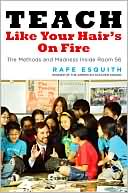 Excerpt
from Teach Like Your Hair's on Fire: The Methods and Madness Inside Room 56
Excerpt
from Teach Like Your Hair's on Fire: The Methods and Madness Inside Room 56
by Rafe Esquith
On the first day of school, within the first two minutes, I discuss this issue with the children. While most classrooms are based on fear, our classroom is based on trust. The children hear the words and like them, but they are only words. It is deeds that will help the children see that I not only talk the talk but walk the walk.
I use the following example with the students on their first day. Most of us have participated in the trust exercise in which one person falls back and is caught by a peer. Even if the catch is made a hundred times in a row, the trust is broken forever if the friend lets you fall the next time as a joke. Even if he swears he is sorry and will never let you fall again, you can never fall back without a seed of doubt. My students learn the first day that a broken trust is irreparable. Everything else can be fixed. Miss your homework assignment? Just tell me, accept the fact that you messed up, and we move on. Did you break something? It happens; we can take care of it. But break my trust and the rules change. Our relationship will be okay, but it will never, ever be what it once was. Of course kids do break trust, and they should be given an opportunity to earn it back. But it takes a long time. The kids are proud of the trust I give them, and they do not want to lose it. They rarely do, and I make sure on a daily basis that I deserve the trust I ask of them.
I answer all questions. It does not matter if I have been asked them before. It does not matter if I am tired. The kids must see that I passionately want them to understand, and it never bothers me when they don’t. During an interview, a student named Alan once told a reporter, “Last year, I tried to ask my teacher a question. She became angry and said, ‘We’ve been over this. You weren’t listening!’ But I was listening! I just didn’t get it! Rafe will go over something five hundred times until I understand.”
We parents and teachers get mad at our kids all the time, and often for good reason. Yet we should never become frustrated when a student doesn’t understand something. Our positive and patient response to questions builds an immediate and lasting trust that transcends fear.
Reprinted by arrangement with Penguin, a member of Penguin Group (USA) Inc., from Teach Like Your Hair's on Fire
Copyright © Rafe Esquith, 2007
